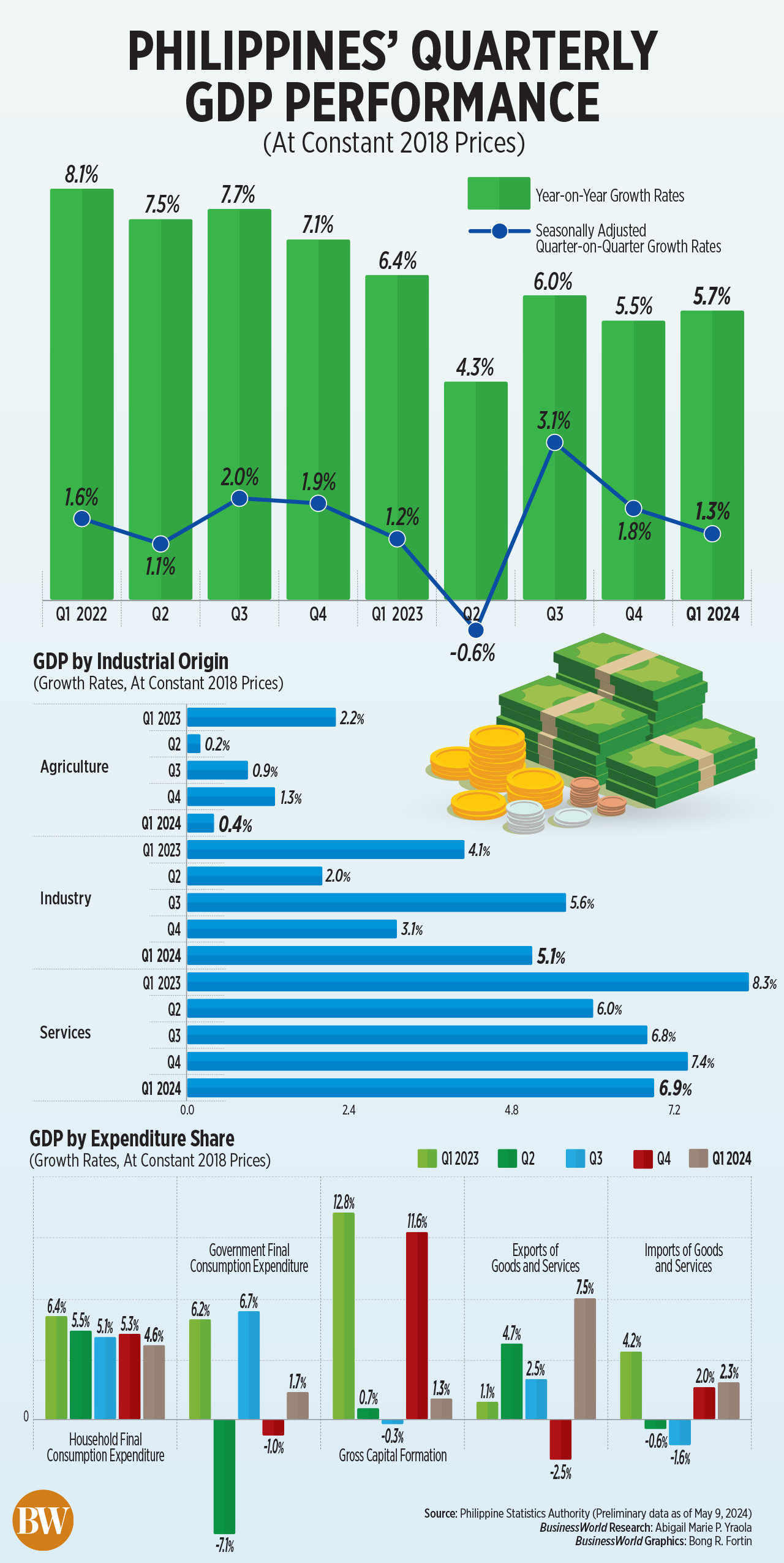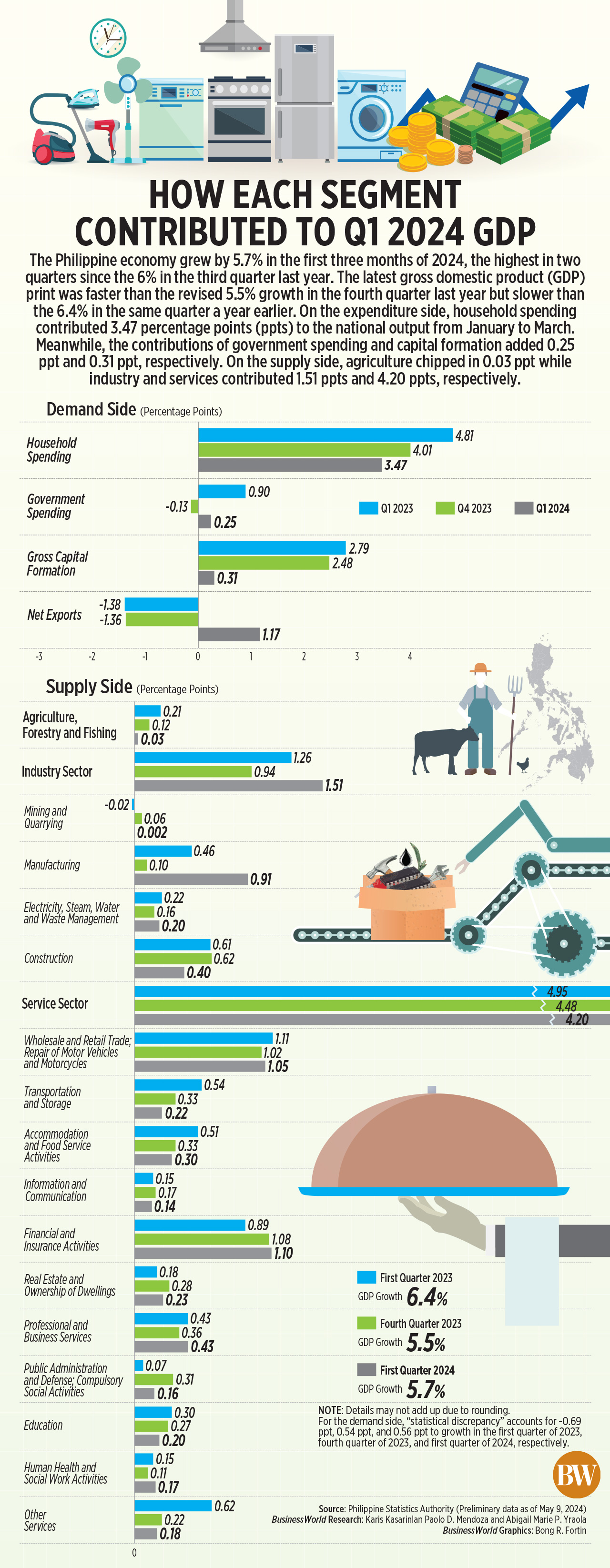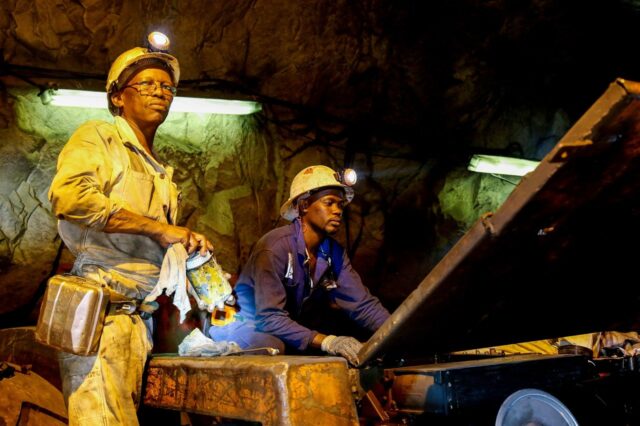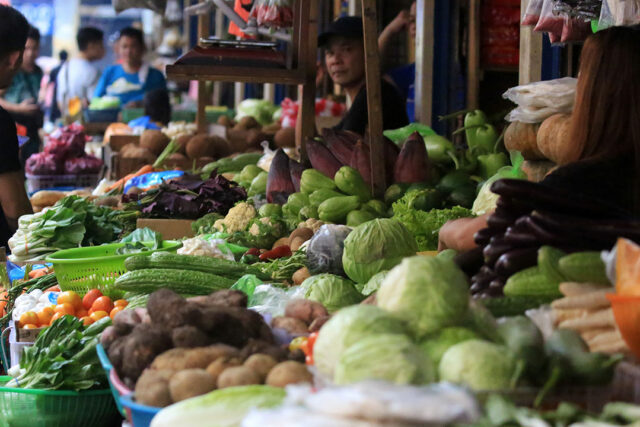THE PHILIPPINE ECONOMY grew by 5.7% in the first quarter, outdoing most of its peers in Southeast Asia despite slowing consumption and government spending, according to the local statistics agency.
But the expansion was below the 5.9% median forecast of 20 economists in a BusinessWorld poll last week. The less-than-expected growth makes a case for the Philippine central bank to keep rates steady next week despite quickening inflation.
“Despite various risks and challenges, the economic outlook for the Philippines in the near and medium terms remains bright,” National Economic and Development Authority (NEDA) Secretary Arsenio M. Balisacan told a news briefing on Thursday.
 “With hard work and the right policies in place, we are confident that we will achieve our growth target of 6-7% this year,” he added.
“With hard work and the right policies in place, we are confident that we will achieve our growth target of 6-7% this year,” he added.
The Philippines’ first-quarter growth is about the same as Vietnam’s 5.6% and ahead of China’s 5.3%, Indonesia’s 5.1% and Malaysia’s 3.9%.
Last quarter’s expansion was better than 5.5% in the previous quarter. On a quarterly basis, the economy grew by 1.3%, the Philippine Statistics Authority said.
Mr. Balisacan said the growth showed the resilience of the Philippine economy, which posted the fastest advance in Southeast Asia last year. But interest rates at a 17-year high and red-hot inflation may be limiting economic activity.
Household spending, which accounts for more than 70% of economic output, rose by 4.6% last quarter, the slowest after a coronavirus pandemic.
Mr. Balisacan attributed weaker consumption to spiraling prices of major food items and El Niño.
The “moderated growth” in domestic demand reflected the less favorable business sentiment, he said. Construction slowed amid prolonged periods of extreme heat.
State spending growth also slowed to 1.7%, while investment increased by 1.3% from 11.6% in the fourth quarter.
“Consumption of durable equipment is also quite low,” Mr. Balisacan said. “That’s the likely effect of high interest rates.”
“Globally, inflation is coming down faster than earlier expected. We should see this continued improvement. Even domestically, we should see loosening of the rates eventually,” he added.
Inflation quickened for the third straight month to 3.8% in April. It was 3.7% in March and 3.4% in February.
“As domestic and external headwinds persist in 2024, the government will continue pushing forward growth-enhancing strategies to boost economic expansion and ensure that the Philippines remains on track with its medium- to long-term goals,” Finance Secretary Ralph G. Recto said in a separate statement.
To finance the P5.767-trillion national budget for 2024, the agency is boosting resource mobilization efforts to collect P4.3 trillion in revenues. “The government is on track to meet this goal, with total revenues already reaching roughly P1.41 trillion as of the end of April,” he said.
The Finance chief also said the government is trying to improve nontax revenues to generate more funds without imposing additional taxes, mainly through dividend remittances from state-owned corporations.
 MODERATE GROWTH
MODERATE GROWTH
Nicholas Antonio T. Mapa, senior economist at ING Bank N.V. Manila, said the first-quarter economic output data strengthen their expectations that full-year growth would settle below the government’s 6-7% target.
“We do not expect any adjustment to the current policy settings,” he said in a note. “However, a sustained deceleration of inflation and disappointment on the growth front could convince the Bangko Sentral ng Pilipinas (BSP) to cut rates as soon as the US Fed does later this year.”
Makoto Tsuchiya, assistant economist at Oxford Economics, expects private consumption to “more or less remain at the current level.” “The drop was bigger than we had expected, but the direction is in line with our narrative that household spending will be subdued this year,” he said in an e-mail.
Despite the weaker momentum brought by a gloomy outlook on exports and investment, Mr. Makoto said growth would likely improve this quarter.
Aris Dacanay, an economist at HSBC Global Research, expects growth to moderate in the second half due to base effects. “The longer the BSP keeps its monetary stance tight, the larger the drag will likely be for growth,” he said in a note.
Economic recovery is unlikely to be robust due to “rising unemployment, stabilizing income and elevated borrowing costs,” ANZ Research economist Debalika Sarkar and Chief Economist Sanjay Mathur said in a separate note.
Mr. Balisacan said the first-quarter growth mirrored the lagged effects of the central bank’s aggressive interest rate increases that began in May 2022.
“What’s so encouraging though is that despite these developments, our exports were able to recover from high negatives last year, especially in the first quarter and in the fourth quarter,” he said.
Exports grew by 7.5% in the first quarter, while imports rose by 2.3%.
The growth of services, which had the biggest contribution to the economy among major industries, eased to 6.9%.
It contributed 4.2 percentage points, followed by industry with 1.51 points and agriculture with 0.03 point. Farm growth also slowed to 0.4% from 2.2% a year ago. Industry growth quickened to 5.1% from 4.1% a year earlier.
Shivaan Tandon, Capital Economics Emerging Asia economist, said weaker economic performance would probably continue.
“We expect further weakness over the rest of the year as tight monetary policy, slower growth in remittances and weaker export demand weigh on activity,” he said in a note.
The Philippine Stock Exchange index slumped by 1.75% or 116.72 points to close at 6,542.46, while the peso finished half-a-centavo stronger at P57.38 a dollar. — Mariedel Irish U. Catilogo














